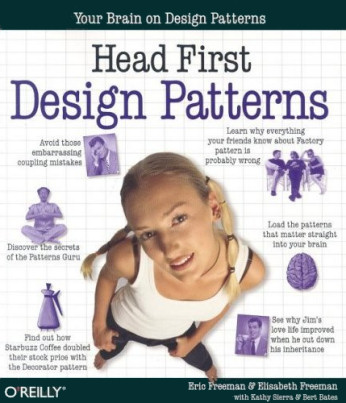
| Authors | Eric Freeman & Elisabeth Freeman |
| Title | Head First Design Patterns |
| Publisher | O'Reilly |
| Year | 2004 |
| ISBN | 978-0-596-00712-6 |
| INSTRUCTOR: | Dr. Rodrigo A. Obando |
| OFFICE: | Center for Commerce and Technology, Room 453 |
| OFFICE HOURS: | TR 5:00 PM – 6:00 PM; 9:10 PM - 10:00 PM and by appointment; |
| PHONE: | (706) 568-5374 |
| E-MAIL: | Obando_Rodrigo@columbusstate.edu |
Prerequisite: CPSC 2108 – Data Structures. An introduction to designing windows applications using object-oriented and component technologies. The emphasis of this course is in event-driven programming using controls and components to develop desktop windows applications. The stress of the course is on the full usage of the Object-Oriented Paradigm for problem-solving and software development using an object-oriented programming language and the Standard Object Modeling Language (UML). (3 credits).
 |
|
| A | 90% - 100% | B | 80% - 89% |
| C | 70% - 79% | D | 60% - 69% |
You are responsible for all class work missed, regardless of the reason for the absence(s). Late assignments will not be accepted. No makeup exams or quizzes will be given, so please make sure you are present for all exams/quizzes. Refer to the CSU Catalog (http://aa.columbusstate.edu/advising/a.htm#Absence Policy) for more information on class attendance and withdrawal.
Academic dishonestyAcademic dishonesty includes, but is not limited to, activities such as cheating and plagiarism (http://aa.columbusstate.edu/advising/a.htm#Academic Dishonesty/Academic Misconduct). It is a basis for disciplinary action. Any work turned in for individual credit must be entirely the work of the student submitting the work. All work must be your own. [For group projects, the work must be done only by members of the group.] You may share ideas but submitting identical assignments (for example) will be considered cheating. You may discuss the material in the course and help one another with debugging; however, any work you hand in for a grade must be your own. A simple way to avoid inadvertent plagiarism is to talk about the assignments, but don't read each other's work or write solutions together unless otherwise directed by your instructor. For your own protection, keep scratch paper and old versions of assignments to establish ownership, until after the assignment has been graded and returned to you. If you have any questions about this, please see your instructor immediately. For assignments, access to notes, the course textbooks, books and other publications is allowed. All work that is not your own, MUST be properly cited. This includes any material found on the Internet. Stealing or giving or receiving any code, diagrams, drawings, text or designs from another person (CSU or non-CSU, including the Internet) is not allowed. Having access to another person’s work on the computer system or giving access to your work to another person is not allowed. It is your responsibility to prevent others from having unauthorized access to your work. No cheating in any form will be tolerated. Penalties for academic dishonesty may include a zero grade on the assignment or exam/quiz, a failing grade for the course, suspension from the Computer Science program, and dismissal from the program. All instances of cheating will be documented in writing with a copy placed in the Department’s files. Students will be expected to discuss the academic misconduct with the faculty member and the chairperson. For more details see the Faculty Handbook: http://aa.columbusstate.edu/faculty/FacHandbook0203/sec100.htm#109.14 and the Student Handbook: http://sa.columbusstate.edu/handbook/handbook2003.pdf You are expected to review the TSYS Department of Computer Science’s Academic Dishonesty Policy - (http://csc.columbusstate.edu/policy/Academic-Dishonesty-Policy.html) |
CSU ADA statement
If you have a documented disability as described by the Rehabilitation
Act of
1973 (P.L. 933-112 Section 504) and Americans with Disabilities Act
(ADA) and
would like to request academic and/or physical accommodations please
contact
Joy Norman at the Office of Disability Services in the Center for
Academic
Support and Student Retention, Tucker Hall (706) 568-2330, as soon as
possible.
Course requirements will not be waived but reasonable accommodations
may be
provided as appropriate.